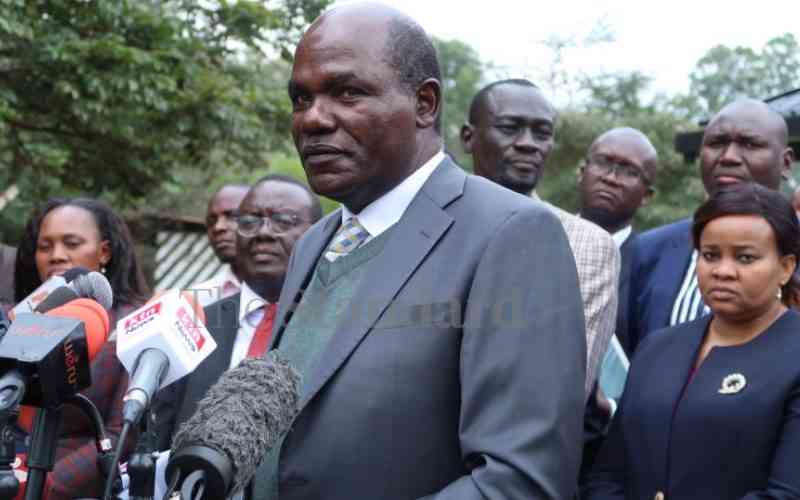Wafula Chebukati, the chairperson of the electoral commission, has disagreed with Attorney General Kihara Kariuki on the method of voter identification.
Chebukati, through lawyer Edwin Mukele, informed High Court judge Mugure Thande that the Independent Electoral and Boundaries Commission (IEBC) is not required to deploy printed voter registers as a supplement to the Kenya Integrated Election Management System (Kiems) kit.

Kenya Human Rights Commission, Katiba Institute, Kenya chapter of the International Commission of Jurists (ICJ)-Kenya, Haki Yetu, Inuka Kenya Ni Sisi, Africa Centre For Open Governance (Africog), and Constitution and Reform Education Consortium filed the case.
Chebukati stated that the case filed by civil society and supported by the AG stems from a misunderstanding of what a complementary system is. He went on to say that the fingerprint is the most basic form of identification. If this fails, he believes a returning officer should enter the voter’s name as a backup system.
“The primary mode of identification is biometrics.” When a voter cannot be identified, the returning officer must use a backup system, an alphanumeric search. “There is a complete misunderstanding of what the complementary system is,” Mukele said. “The first and second respondents acted within the law in refusing to deploy the printed register.”
He also stated that if the kits and replacement fail, a manual or printed register is the last resort. The commission should approve the use of a manual register. “The printed register is not the complementary system proposed by the petitioners,” Mukele explained.
Chebukati took the opposite stance as the AG, who criticized IEBC for indicating that it will not use a manual register to identify voters if the electronic voter identification kits fail.
“It is our humble considered opinion that the decision by the first and second respondents (IEBC and Chebukati) to completely avoid the use of printed/manual register as a complementary system provided for under section 44 A of the Election Act is a move that goes to offend both the spirit and letter of the constitution,” said the AG’s lawyer, Dan Weche.
The AG agreed with Azimio that the IEBC should use both electronic and manual registers to identify voters. His position on voter identification differs from that of the United Democratic Alliance (UDA), which supports only electronic voter registration.


According to Kihara, the Supreme Court found in 2017 that the IEBC’s technology has yet to achieve reliability to be considered an irreversible foundation of an electoral process.
He also cited a Court of Appeal decision holding that using Kiems kits during an election without a physical register is discriminatory to people whose biometrics cannot be picked.
Although the law does not define a complementary system in an election, the AG stated that the manual register should be used as a backup. “Because the complementary system is not expressly defined in the statute, it is our humble submission that the use of printed/manual register as the complementary system,” Kihara said.
“A printed or manual register is best to protect voting rights for both registered voters whose details may fail to appear or be picked in the electronic system, as we have demonstrated in our submissions, which are further supported by court thinking in a similar question.”
Both registers are also desired by the Kenya National Commission on Human Rights (KNCHR).
The IEBC stated that it would only use its digital register to identify the 22.1 million voters, but it has been accused of bias.
Fidelis Limo, the State Agency’s lawyer, argued that the IEBC cannot guarantee that its electoral technology will not fail. According to him, the only guaranteed backup is a manual register.
According to the groups, the IEBC has failed to comply with a 2017 Supreme Court ruling requiring it to connect all polling stations to a 3G/4G network, and the commission has admitted that at least 1,111 polling stations lack 3G coverage.


